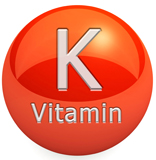Vitamin K – Uses, Benefits, Sources and Dosage

It is a fat soluble vitamin.
It plays an important role in blood clotting. It has also important role in protection of heart and keeps the bones strong. Sometimes it is referred as “the forgotten vitamin” because major benefits are overlooked. Typically it is not a dietary supplement, actually it is a group of compounds.
Types of Vitamin K
There are three types of vitamin K which are given below:
1. Vitamin K1 or Phylloquinone
The main source is plants, green vegetables. It directly enters the liver and helps to maintain blood clotting.
2. Vitamin K2 or Menaquinone
It is made from bacteria which lies on gastrointestinal walls and keeps your bones, tissue and blood vessels healthy.
3. Vitamin K3 or Menadione
It is a synthetic form and may cause toxicity.
Sources of Vitamin K
It is found in following foods:
- Green Vegetables like spinach, turnip, mustard greens, parsley and green leaf lettuce.
- Vegetables like sprouts, broccoli, cauliflower and cabbage.
- Fish liver, meat, eggs and cereals in small amounts.
- It is also made by bacteria in the lower intestinal tract.
Deficiency of Vitamin K
Deficiency of vitamin K is rare but it is due to abnormal absorption of vitamin K which may be due to malfunction of liver and problem in metabolism.
The common symptoms associated with deficiency of Vitamin K are following:
- Delayed blood clotting
- Hemorrhages such as nose bleed
- Low blood platelets
Benefits of Vitamin K
It is also known as Clotting Vitamin. It has important role in blood clotting.
Vitamin K is useful in various diseased conditions which are given below:
- It supports healthy heart and cardiovascular system.
- It helps to maintain healthy bones and muscles.
- It is also beneficial for brain health, insulin resistance and promote natural antioxidant activity in body.
Dosage of Vitamin K
The dose of vitamin K recommend on the basis of person should get each day. It depends upon age, gender and other factors such as pregnancy, breast feeding or any illness.
Dose for Infants
- 0 to 6 months: 2.0 micrograms per day mcg/day)
- 7 to 12 months: 2.5 mcg/day
Dose for Children
- 1 to 3 years: 30 mcg/day
- 4 to 8 years: 55 mcg/day
- 9 to 13 years: 60 mcg/day
Dose for Adolescents and Adults
- Males and females age 14 to 18: 75 mcg/day
- Males and females age 19 and older: 90 mcg/day for females (including those who are pregnant and lactating) and 120 mcg/day for males.
Don’t Forget the Fat
It is fat soluble vitamin then it requires fat for proper absorption. So don’t forget take little amount of fat in your diet. It also helps in absorption of vitamin D and plays important role in protecting the brain, nervous and endocrine system.



